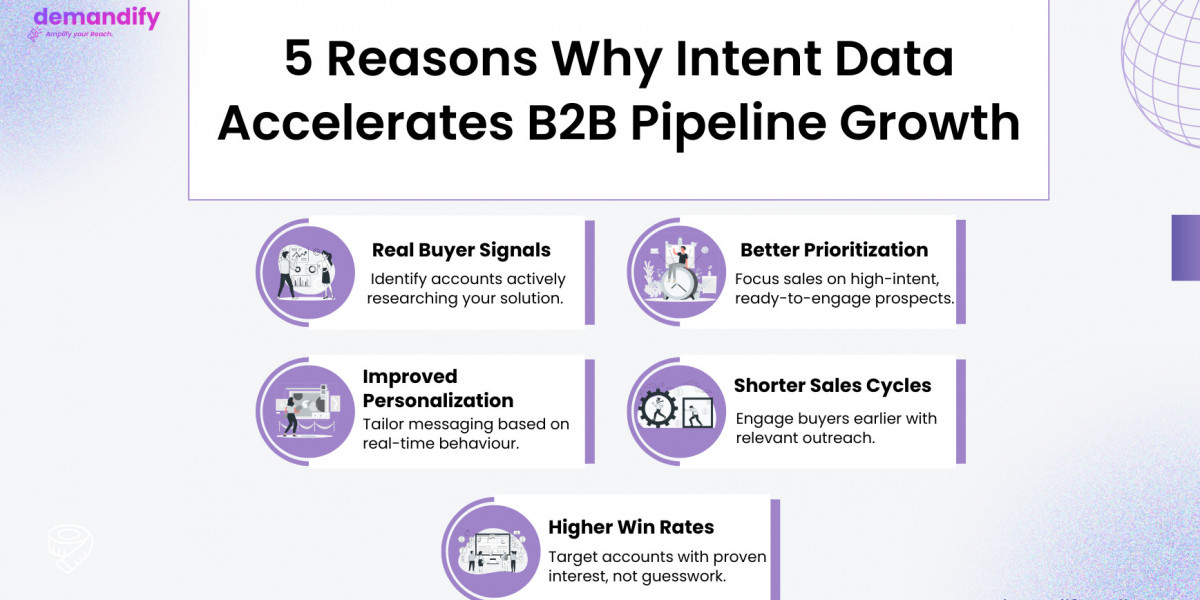B2B buying journeys have been more complicated. They have become longer, noisier, and more fragmented. Prospects are reading content and watching videos through dozens of different channels before they even think about filling out a form or talking to a salesperson. In such an environment, marketers are not allowed to use limited or surface, level signals (like page visits or email clicks) any longer.
By identifying the companies that are actively looking into your solution category, intent data is the instrument that gives your team the top hand even before the competitors realize the demand spike. That is why intent data is different and better.
Five reasons for which intent data has turned into a pipeline, accelerating machine for contemporary B2B companies are listed below.
1. It Reveals In-Market Buyers Before They Convert
More than half of the research is done by prospects before they even land on your website. Intent data captures keywords, content consumption, and research spikes from the whole web, not just from the channels you own.
That is why your team can be in touch with the possible buyers way before they are ready, thus helping them through the decision process before they shortlist the competitors.
2. It Prioritizes Accounts With the Highest Revenue Potential
Many times, sales teams lose a lot of time trying to work on accounts that are not responding, only because they do not have intent signals.
Using intent data, it is possible to prioritise companies according to real buying interest, thus giving a great focus to the teams on what really matters:
Knowing which accounts are most active in search
Firms that are doing vendor comparisons
Buyers that are looking into their particular pain points
Consequently, this leads to better productivity and the time from the first contact to a qualified opportunity is shortened.
3. It Aligns Sales and Marketing Around Real Demand
Intent data is a tool that gets rid of the guessing game. Now, both teams have access to the very same insights:
The topics that accounts are researching
The frequency of their searches
The content formats they use
The openness certainly sets the teams working together right away. Marketing is the one who knows the exact target, and sales is the one who knows the person to call, thus, the friction is lessened, and the handoff are improved.
4. It Enables Ultra-Relevant Personalization
Once you understand what a buyer is looking up, you can figure out what matters most to them. Goal insights provide you with the means to come up with a message that is most suitable for their very stage and requirements.
One, to, one approach depending on difficulties
Very precisely targeted ads
To be tied to certain topics nurture sequences
The return to the audience of this communication is higher because they react more, more meetings have higher conversion rates and trust is established faster.
5. It Accelerates Pipeline Velocity Across Every Stage
Intent data speeds up each funnel stage of the funnel
Top of Funnel: Engaging with the accounts that are clearly in need of your product or service.
Middle of Funnel: Providing the content that matches their information, gathering process
Bottom of Funnel: Giving sales the knowledge of customer insights to overcome resistance
The outcome is a reduced sales cycle and higher, quality opportunities making up the pipeline.
Final Thought
Intent data is not simply one more marketing tool, it is a competitive advantage. Businesses that make use of it have better results than those which still employ conventional lead generation techniques, as they can reach the buyers at the exact time: when they are actively looking and are willing to get in touch. In case your objectives are to have a higher qualified pipeline, quicker sales cycles, and improved forecasting, then using intent data is what should basically guide your B2B expansion strategy.







